Hypoallergenic Cats & Tips to Prevent Cat Allergies
Free Pet Insurance Comparison
Compare Quotes From Top Companies and Save
Secured with SHA-256 Encryption
Dr. Pippa Elliott BVMS, MRCVS
Veterinarian
Dr Pippa Elliott BVMS, MRCVS is a veterinarian with over 30 years of experience in companion animal practice. In 1987 she graduated from the University of Glasgow, with a degree in veterinary medicine and surgery. She works at Blythwood Vets and the People’s Dispensary for Sick Animals (PDSA). Pippa is an advocate of Fear-Free Practice, an animal addict, and a veterinary writer. She is also w...
Veterinarian
UPDATED: Dec 8, 2023
Pet Insurance U receives compensation from the third parties included on this site. This includes payment for clicks from our site to insurance providers’ sites and quote requests generated. Our rankings and reviews are not affected by payments from the insurance companies. The compensation we receive allows the site to be free and regularly updated. Our goal is to review every pet insurance provider, but not all companies are listed on the site.
And many of the companies we review do not pay us anything. We simply rate, compare and review their plan because we feel it will be valuable to you. Our reviews are guaranteed to be unbiased, professional and advertising compensation does not influence rankings.
We are a free online resource for anyone interested in learning more about pet insurance. Our goal is to be an objective, third-party resource for everything pet insurance related. We update our site regularly, and all content is reviewed by pet insurance experts.
UPDATED: Dec 8, 2023
Pet Insurance U receives compensation from the third parties included on this site. This includes payment for clicks from our site to insurance providers’ sites and quote requests generated. Our rankings and reviews are not affected by payments from the insurance companies. The compensation we receive allows the site to be free and regularly updated. Our goal is to review every pet insurance provider, but not all companies are listed on the site.
And many of the companies we review do not pay us anything. We simply rate, compare and review their plan because we feel it will be valuable to you. Our reviews are guaranteed to be unbiased, professional and advertising compensation does not influence rankings.
On This Page
There are many cat lovers out there who would love to bring a feline friend into their home but are afraid to do so because they are allergic.
Cat allergies are not fun with the constant itching and sneezing that occurs merely by petting a cat. Just touching their fur can provoke a reaction.
In fact, cat allergies are so prevalent that they occur in twice as many people than dog allergies.
But, there are so many amazing characteristics of felines and they make such great pets, so what’s a cat lover with allergies to do?
Bring a hypoallergenic cat into your home.
What Makes a Cat Hypoallergenic?
While there is no such thing as a cat that is guaranteed to stop allergic reactions, there are some cats that tend to be more hypoallergenic.
They are known as hypoallergenic since they produce fewer allergens than other cats.
A cat has a protein in its saliva that is referred to as FelD1 and this protein causes an allergic reaction in certain people. The cats that are considered hypoallergenic deliver far less of the FelD1 making them more suitable for cat lovers with allergies.
Enter your ZIP code below to view companies that have cheap pet insurance rates.
Secured with SHA-256 Encryption
Top 10 Best Hypoallergenic Cat Breeds
While there are no cats that are completely hypoallergenic, there are many cats that produce fewer allergens.
Here is our list of the best hypoallergenic cat breeds that are great for cat lovers with allergies:
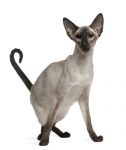
Balinese
The Balinese are very similar looking to the Siamese, but with longer hair. While they might not appear to be a good cat for allergy sufferers, they produce far less of the protein, FelD1 making them a good fit.
The Balinese are pretty, smart and have a lot of personalities. If you are looking for a quiet cat, the Balinese isn’t it! They are very vocal and sociable and will make you smile on a daily basis!
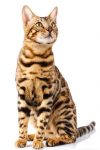
Bengal
Bengal cats are great for the allergy-prone because they have very fine fur which makes them in less need of grooming themselves than others. Because they don’t need to groom as much, they spend less time each day licking their fur.
The less they lick, the less the saliva spreads the dander, which is another common cause of allergies.
The Bengal is a very sweet cat and known for its athleticism and ability to jump from great heights!
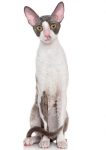
Cornish Rex
The Cornish Rex has a short, finely textured coat and while they do shed, it is less frequent than most breeds. Their fur has an almost suede-like feel and is made of down, not fur.
They do require frequent baths because their skin tends to retain an oil build-up. These beauties are best suited for cat lovers with mild allergies as they are not completely hypoallergenic but are still suitable!
The Cornish are inquisitive, extremely active and playful. They are great for kids and families with their sociable outgoing personalities.
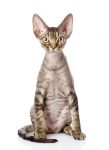
Devon Rex
The Devon Rex is similar to the Cornish Rex in appearance, but they have shorter and much less fur. The Devon doesn’t need to be bathed as much as the Cornish, but both their paws and ears need to be cleaned out from oil building up.
The Devon Rex has a curly and soft coat. Because the coat is shorter, the Devon doesn’t shed very much which results in fewer allergens around the house.
The Devon Rex is very sociable and is an amiable cat that is easy to train. They are less vocal than other cats if you prefer the quieter type.
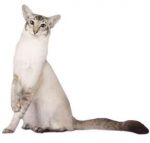
Javanese
The Javanese have a unique, medium-length coat that doesn’t mat as much as other cats. They don’t have an undercoat which means they shed less and release fewer allergens.
The Javanese cats are intelligent and devoted kitties that are very trainable. They are also very affectionate and are known to purr right in your ear and will look you in the eye as if they are speaking directly to you!
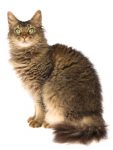
LaPerm
The LaPerm is a unique cat with a curly coat which tends to keep the dander on them and not around your home. Of course, you need to brush and groom their coats, but they are a very good fit for cat lovers with allergies.
LaPerms are very sociable cats and known to purr a lot and loud!
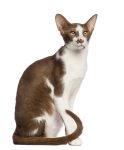
Oriental Shorthair
The Oriental Shorthair has very short hair (as the name suggests) and is a good fit for those will allergies. Their coat is smooth and silky and their bodies are sturdy. They certainly shed less than most cats, but consistent grooming will help keep the dander away.
The Oriental is an outgoing, enthusiastic breed that loves people and attention. They are extremely curious and will follow you around the house to see what you’re doing.
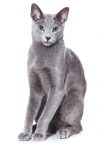
Russian Blue
The Russian Blue has a double coat that is short and plush. Similar to the Balinese, Russian Blues produce very little FelD1 which makes them a good kitty for those with allergies.
Their double coat makes them appear bigger than they really are and they have beautiful green eyes which makes their appearance that more striking.
Russian Blues are very affectionate, gentle and intelligent, although they can be shy upon first meeting them. They love people and are eager to be stroked and pet.
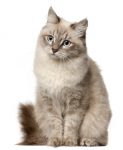
Siberian
The Siberian has a longer coat than most on this list, but are still considered hypoallergenic because they have a lower enzyme level of FelD1 in their saliva. In fact, 70% of the people who own Siberians and are allergic claim to have no reaction at all to the Siberian!
The Siberian has a thick coat and athletic build which makes them ready for cold temperatures and all climates.
Siberians are very agile, intelligent and great for families and get along well with other pets including dogs.
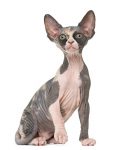
Sphynx
The Sphynx is one of the most hypoallergenic of all the cat breeds because they have no hair! Although they have no hair, they still need to be groomed and bathed often which will make them less allergic.
They tend to have an oil buildup on their skin and inside those large, bunny-like ears so keep them clean!
Their crinkly skin can make the young ones even look mature!
What they don’t have in fur, the Sphynx makes up for in personality. They want to entertain you and be with you as they follow you around from room to room.
Tips to Minimize Cat Allergies in Your Home
While all of the cats on the list are considered hypoallergenic, it does not mean that you will never have an allergic reaction.
Every cat and breed is different, so the best thing you can do is to try to spend some time with a cat that you would like to adopt or bring home to see if you have an allergic flare-up.
If you have a cat and are allergic, below are some other things you can do help minimize your allergies:
Brush and Bathe Your Cat Often
By regularly brushing and bathing your cat, the dander is being removed much more quickly which can help cause fewer allergic reactions.
Vacuum Regularly
The more you vacuum your floor or carpet, the less likely there will be a big fur build-up. Vacuum the furniture too, particularly where your kitty likes to hang out using the hand tools that accompany a vacuum. The HEPA vacuum is perfect for cat dander.
Wash Cat Bedding
Wash all bedding in 140-degree hot water at least twice monthly. If you can keep the bedding clean and dander-free, you will have fewer flare-ups and very clean bedding for your kitty. A win-win!
Wash your hands immediately after petting your cat
After you play with your cat, make sure to wash your hands with anti-bacterial soap. If you rub your eyes, you might be itching for hours.
Add Omega 3 Oil to Your Cat’s Diet
The addition of Omega-3 fatty acids to the diet will keep your cat’s skin supple and healthy. Many people who have put their cats on homemade or raw diets find have found their allergies have at least been reduced. If you can stop feeding your cat dry food where the most questionable ingredients and stray chemicals are found, that is very helpful for many reasons!
Have a cat-free room
If you are very allergic, you might consider having a cat-free room (assuming you have more than one)! It can be your place of refuge if you are feeling an allergy attack coming.
Consider a stand-alone HEPA filter or two placed strategically throughout your home
HEPA filters remove tiny airborne pollutants, like dust mites, pollen, and pet dander, from the air you breathe. Within a given area stand-alone filters are typically more effective than a whole-house HEPA system. They don’t have to be that expensive and place a few throughout your home
Final Thoughts on Hypoallergenic Cat Breeds
If you are a cat lover that is prone to allergies, you might consider one of these hypoallergenic breeds.
Only you will know how you react and if the kitty is a good fit.
There are many people who have minor cat allergies and will eventually develop immunity by hanging out with their cat and getting used to their smell and fur.
Cats are amazing, fun and very low maintenance (besides the shedding) and can be a wonderful addition to any family. They are worth the sneezing!
Other articles you may find helpful:
Is Exotic Pet Insurance Necessary?
The Best Pet Insurance By State
Fun Facts, Dog FAQ, And Unsolicited Dog Advice
5 Training Commands to Save Your Dog’s Life
The Ultimate Guide to Safe Foods for Dogs
We have worked hard to provide you with all the free resources possible to help give you insight into the best pet insurance for cats, additional cat breeds info, common cat health issues, and a fun look at frequently asked cat questions.
Learn more about common cat health problems:
Arthritis in Cats, Cancer in Cats, Declawing Cats, Diabetes in Cats, Eye Infection in Cats, Hypoallergenic Cats, Hyperthyroidism in Cats, Overweight Cats, Vomiting Cats
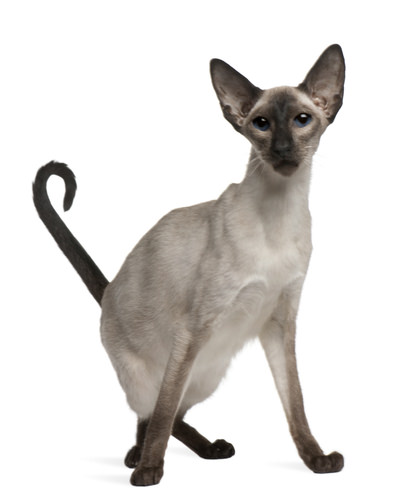
Frequently Asked Questions
What makes a cat hypoallergenic?
Hypoallergenic cats produce fewer allergens, specifically the FelD1 protein in their saliva. While no cat is guaranteed to stop allergic reactions, these breeds are considered more suitable for cat lovers with allergies.
Are there completely hypoallergenic cat breeds?
No cat breed is completely hypoallergenic, but some produce fewer allergens. The list of hypoallergenic cat breeds includes Balinese, Bengal, Cornish Rex, Devon Rex, Javanese, LaPerm, Oriental Shorthair, Russian Blue, Siberian, and Sphynx.
What are some characteristics of hypoallergenic cat breeds?
Hypoallergenic cat breeds, like Balinese and Russian Blue, often have specific coat types, such as shorter or finer fur. They may also exhibit fewer grooming behaviors, reducing the spread of allergens.
How can I minimize cat allergies at home?
To minimize cat allergies, consider brushing and bathing your cat regularly, vacuuming frequently, washing cat bedding, washing hands after petting, adding Omega-3 oil to your cat’s diet, and having a cat-free room.
Are all hypoallergenic cats suitable for people with allergies?
While hypoallergenic cats are considered more suitable, individual reactions vary. Spending time with a cat before adopting is recommended. Additionally, implementing measures like regular grooming and using HEPA filters can help minimize allergies.
Enter your ZIP code below to view companies that have cheap pet insurance rates.
Secured with SHA-256 Encryption
Dr. Pippa Elliott BVMS, MRCVS
Veterinarian
Dr Pippa Elliott BVMS, MRCVS is a veterinarian with over 30 years of experience in companion animal practice. In 1987 she graduated from the University of Glasgow, with a degree in veterinary medicine and surgery. She works at Blythwood Vets and the People’s Dispensary for Sick Animals (PDSA). Pippa is an advocate of Fear-Free Practice, an animal addict, and a veterinary writer. She is also w...
Veterinarian
We are a free online resource for anyone interested in learning more about pet insurance. Our goal is to be an objective, third-party resource for everything pet insurance related. We update our site regularly, and all content is reviewed by pet insurance experts.


